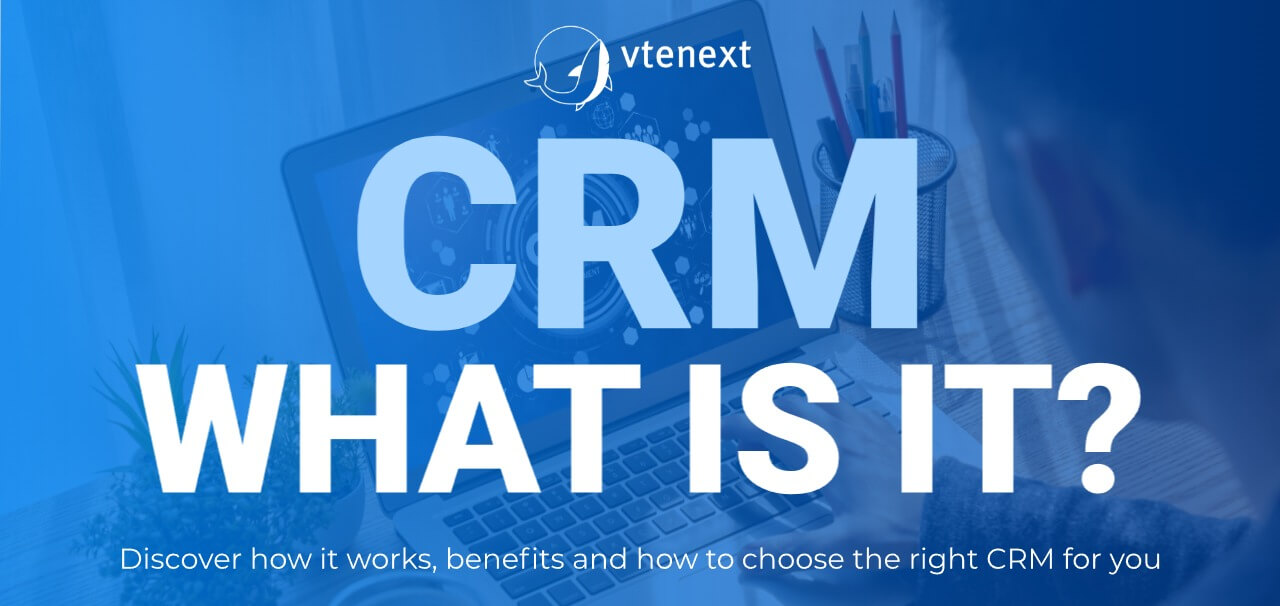What is a CRM?
CRM stands for “Customer Relationship Management.”
The meaning of CRM is related to the customer relationship and, therefore, all the strategies, software, technologies, and processes used by organizations to engage, acquire, manage and retain potential and current customers.
CRM has become a key tool for companies that want to increase their competitiveness and improve their business.
In this guide, you will find everything there is to know about CRM software, as well as information that can help you make your choice.
Talking about CRM, three fundamental aspects are referred to:
- Strategy: CRM is a philosophy that should be embraced and shared by the entire company and concerns how the relationship with current and potential customers should be managed.
- Software and technology: the software platform that records, organizes, and manages interactions between the company and customers.
- Processes that require the joint efforts of marketing, sales and customer support teams.
The main goal of CRM is to increase customer loyalty and sales opportunities.
How does CRM software work?
CRM collects, stores and manages customer and lead data in a centralized location, allowing companies to have a complete view of all interactions.
A CRM platform includes various features and controls different business processes.
Contact Management
Contact management involves the process of recording all contacts and their details (email addresses, phone numbers, product/service preferences or contact preferences). Unlike the past, where information risked getting lost in agendas or files like spreadsheets, CRM allows you to track all customer interactions with the company. This provides a unified customer view accessible to all employees and updated in real-time. Customer data can also be used to create reports and aggregates based on geographical areas or segmented according to marketing campaigns.
Lead Management
A lead is a potential customer who has shown interest in a product or service but has not yet made a purchase. Lead management plays an increasingly central role in companies. The risks of not contacting a lead or contacting them too late are clear: the potential customer may turn to another company and spread negative word-of-mouth, damaging the company and impacting revenue.
Thanks to CRM, it is possible to acquire and profile potential customers in a single database, create automated lead assignment and verification processes, track every interaction, coordinate the sales team, plan follow-up activities and schedule automatic reports to measure performance.
Sales Management and Sales Pipeline Management
Sales are the lifeblood of any company and the management of the sales process and orders is fundamental.
Managing sales through CRM software allows you to track sales opportunities and the status of processes by creating a stable and reliable sales pipeline.
It is possible to estimate incoming cash flow and guide potential customers through the sales process, transforming them quickly into stable and loyal customers.

Marketing Activity Management
Customer touchpoints are multiple: website, social media, events, fairs, webinars, email.
It is not always easy to manage and control all these channels. Thanks to CRM software, it is possible to segment and define specific targets to send personalized and targeted content, improving not only customer relationships but also conversions. Most CRM software ensures data management compliance with GDPR regulations.
Customer Support Management
Effective customer management encloses all touchpoints and moments of the customer’s experience, from the initial contact to product/service delivery, post-sale services, and customer care.
With CRM software, managing customer support efficiently and quickly is very easy. You can create support tickets from a shared platform, assign tasks and responsibilities to different company areas, and easily track interventions. You can also plan support interventions, monitor and record calendar-based interventions, account for completed interventions, and share real-time documentation related to intervention reports.
Human Resources and Internal Process Management
In general, the customer is the one who makes a request and verifies the output; instead the supplier is responsible for creating it, identifying the how, the tasks and the materials to be used. These requests can also come from within the company, such as from human resources.
The processes related to human resources can be managed through CRM software. In particular, the onboarding phase of a new resource requires significant organizational efforts as it is necessary to provide all the needful information, notify all relevant departments, assign devices, define platform access, etc.
Do I Really Need CRM?
The primary users of CRM software are, of course, companies with a relatively large customer base. However, thinking that CRM is only for those with marketing and sales departments is limiting. CRM can be used by many other departments and for various activities: where there is a relationship to manage and track, CRM can be helpful.
A good way to determine if CRM is right for you is to evaluate whether you still have control over sales and customer support. If your customers regularly interact with multiple people in your company, it becomes easier to track these interactions with a CRM. CRM can also help you define workflows and processes, and rate the performance of your employees.
What are the Benefits of Having a CRM?
Adopting CRM software has multiple advantages:
- Centralized database: in the CRM, you can find all the information about your customers that is easily accessible to anyone in your company who needs it.
- Time-saving: employees save time searching for information and can provide a better customer experience.
- Increased productivity: CRM maps business processes accurately. Furthermore, with solutions that include automation, processes can be digitized and executed by the software, allowing employees to focus on higher-value activities that require human intervention.
- Increased sales: CRM simplifies the sales process by precisely managing each lead, which is no longer neglected or abandoned. The sales team works collaboratively, accesses a single platform and can verify its performance against targets.
- Lead nurturing: CRM automatically manages the process, automatically notifying employees when they need to contact potential customers. Automatic mailing processes also allow you to engage leads with new, relevant content to cultivate and nurture the relationship.
- Loyalty of existing customers: after converting a lead into a customer, it is necessary to take care of them and ensure their experience is excellent. With CRM, you can manage support, monitor and measure their satisfaction to identify any potential issues in advance and resolve them quickly. CRM allows you to inform the customer about new products, features or services, providing new cross-selling and up-selling opportunities.
- Improved customer service: with CRM, you can manage support tickets, plan interventions or monitor problem resolution times.
- Detailed reports and analysis: having a lot of customer data doesn’t necessarily mean you know how to use it to gain valuable insights. CRM allows you to create reports and dashboards to measure the performance of your sales team, marketing campaigns, or customer service.
What Aspects Should I Consider When Choosing the Right CRM Software?
With the multitude of CRM solutions available, finding the one that works best for your business can be a challenge. Below are some aspects to consider in your decision:
- Needs and priorities: identify your needs, list the pros and cons of your current system and evaluate the areas you want to improve. People think that investing in a more sophisticated CRM platform is the best choice. However, it might represent more of a disadvantage than an advantage. The advice is to make an intelligent investment by choosing a lean solution, starting small, and then assessing growth needs over time.
- Scalability: can the CRM grow as your business grows without excessive costs and additional implementations?
- Integration with current systems: you should prefer CRM systems that can be quickly integrated via APIs with your existing software and don’t require extensive customization.
- Reliability: evaluate the support provided in case of questions, doubts, malfunctions or data loss.
- Easy and immediate data import and export in formats like Excel or CSV.
- Data security and privacy: verify that the CRM provider has all the necessary certifications and implements technical and organizational measures to protect privacy and comply with GDPR regulations.
- Ease of use: even the most intuitive software might require some time to master. Consider whether the vendor offers training for your team and at what cost. More complex and sophisticated software may have a slower learning curve than a lean solution.
- Mobile Use: access to the database should be guaranteed for all employees from any device and location in total security.
- Customization: evaluate the possibility of choosing a CRM that allows you to make affordable customizations.
- On cloud or on-premise: we dedicate the next paragraph to this aspect.
CRM in the Cloud or On-Premises: What’s Better?
The most obvious difference between cloud and on-premises solutions is where information and software are stored. While on-premises software is installed on local computers and/or servers, with cloud solutions, CRM data and software are stored on remote servers, accessible via an internet connection.
Advantages of a Cloud Solution
Cloud computing has undoubtedly revolutionized the world of software and changed how we manage data storage and access.
Cloud CRM solutions have clear advantages:
- Faster implementation: the required configurations are limited and the installation occurs on hundreds of computers in a shorter time frame.
- Reduced infrastructure costs: maintenance, backup and data update costs that are managed by the software provider disappear.
- Scalability: changes in your business can be managed more easily because increasing (or decreasing) storage capacity in the cloud is a matter of changing the subscription. There’s no need to invest in expensive additional servers or IT personnel.
- Accessibility: data is accessible to those who need it, wherever they are, and it’s updated in real-time, ensuring that everyone has access to the most recent information.
- Enhanced collaboration: teams located in distant locations can collaborate using a single platform and share information to improve overall performance.
- Fast integration with other systems: you can connect the CRM with other systems via APIs in a flexible, fast and high-performance way.
Advantages of an On-Premises Solution
On-premises solutions have their advantages, especially in terms of security:
- Transparency: data is typically stored internally on your own servers, so you always know where your data is and have control over updates and security measures.
- Avoiding downtime: black-out in cloud computing solutions are extremely rare. However, it’s understandable that many businesses want to ensure uninterrupted service and, therefore, choose proprietary servers.
- Control over software update timing: you decide when to perform software updates independently.
- Data management: many companies want complete control over data recovery and GDPR compliance.
How Can I Start Using a CRM?
Whether you are an entrepreneur, a manager or someone responsible for implementing a new CRM, choosing the right software can be complex. To save time and simplify the decision, we have prepared a list of key considerations that will guide you in selecting the right platform.
Who is vtenext?
We are a 100% Italian company that has developed a unique CRM platform.
With vtenext, you can manage all your marketing, sales, after-sales, customer support and human resources activities in a single system by automating and digitizing all business processes. Vte is the only solution with a BPMN engine to design, implement, and automate all customer-involved business processes.
Our CRM platform is unique in the world because it records, stores and manages all customer data, making it available to the entire company. Furthermore, it automates all your processes using the best Artificial Intelligence technologies and the BPMN engine.
Download the Guide!
Download our guide and discover how to choose the CRM that fits your needs!
